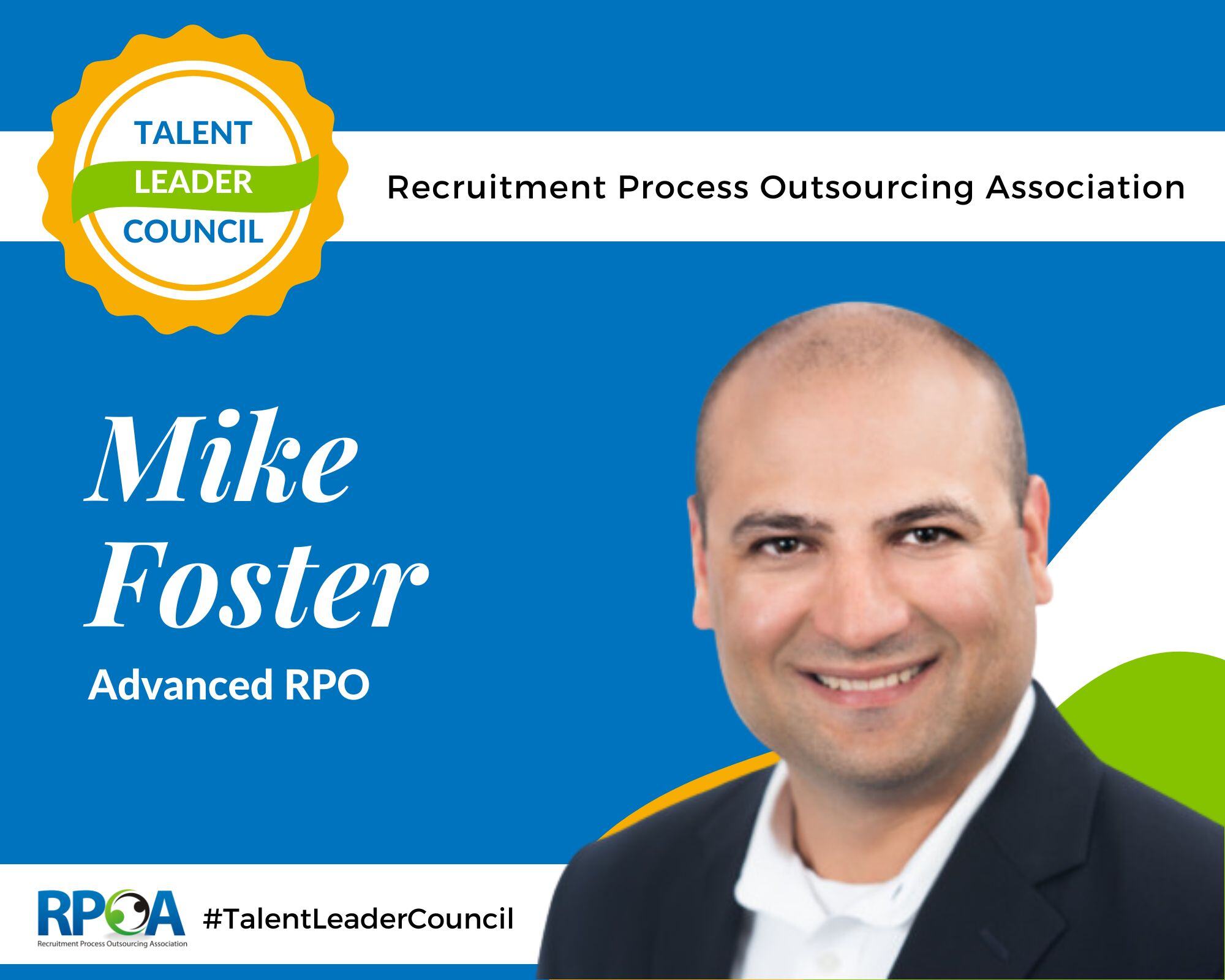
Strategic partnerships with recruitment process outsourcing (RPO) providers can significantly enhance hiring consistency and elevate the quality of hire. Lamees Abourahma of RPOA spoke with Mike Foster, Account Director for Advanced RPO, about how employers can create consistent hiring processes that move them from hiring anybody to hiring quality talent by partnering with RPO providers.
The interview explored RPO providers' significant role in transforming businesses' hiring processes. Foster touched upon why employers should partner with RPO providers, factors that trigger erratic hiring, the effects of a contrary recruiting process, the drawbacks of hiring quantity over quality, the positives of a consistent hiring process, the best practices of balancing quantity and quality of hires, and how RPO can help create consistent recruitment processes. The following is an edited version of the first part of this Talent Leader Council interview.
RPOA: Why should a company partner with a Recruitment Process Outsourcing (RPO) provider?
Mike Foster: When an employer decides to move to an RPO solution, they know they are partnering with recruiting and hiring experts. Companies tend to have minimal experts in recruiting and will give their talent acquisition team a lot of other tasks to complete. For instance, you'll see many TA teams responsible for HR and recruiting. Recruiting is a full-time function within a business; sometimes, people need to remember that. When RPO is done right, companies can expect to see results relatively quickly, and some of those results they were surprised to expect. Many of those results could be reported, such as the consistent recruiting process and quality of hire, because companies often focus only on the recruiting piece of the process. In contrast, RPO providers focus on the recruitment process as a whole spectrum of hiring actions.
Q: What are some factors that can lead to inconsistent quality of hire?
Foster: Inconsistent quality of hire happens when companies don't have a consistent recruitment process in place, don't focus on their talent acquisition department, are short-handed, or lack the systems and tools to build a consistent, efficient, and effective process.
Q: What are the effects of an inconsistent process of recruiting?
Foster: An inconsistent recruitment process results in a poor candidate experience; the process treats every candidate differently. The hiring manager experience could be better, too. And when you factor all these in, it gets bumpy. People hired usually aren't the top talent. The newly hired person doesn't know what to expect about the job; they don't understand the job clearly. On top of that, the hiring managers didn't properly interview the candidate to know whether this is genuinely the right person to hire. They end up making a low-quality hire because they feel there are no other people to talk to or there's no other person to do the job. Often, this kind of hiring decision comes from gut feelings, which results in higher turnover and a hiring process that recruiters can't measure accurately. Companies will then resort to well, "It took us a month and a half, two months, to get to the end of this process. This candidate is the best person we think we can find, and we decided to hire that person," which is ineffective.
Q: What are the drawbacks of prioritizing merely hiring over focusing on the quality of hire?
Foster: The bottom line is that you end up not hiring the right person, and retention tends to increase. Most of the time, when we [RPOs] come in as a hiring partner, we first see high turnover. We can identify throughout the process where the employer focused on getting people in the door as quickly as possible. The employer thinks they need as many people as fast as possible. Fortunately, with RPO, employers can hire based on quantity and quality.
Q: What are the effects of a consistent recruiting process
Foster: A consistent hiring process dictates consistent quality of hire. A consistent recruitment process removes biases, focuses the hiring decision on skill set and proper fit, speeds up the process for candidates, shortens the hiring process for the company, and creates an accountable hiring process.
Q: How do you balance quantity and quality of hire?
Foster: From an RPO perspective, hiring that balances quantity and quality takes a consistent process that employers can mirror. They also need to condense the process as much as possible. That means reducing hiring manager interviews to one or two. Making hiring decisions faster, getting everybody in the process to understand what a quality candidate is, moving them through as quickly as possible, and then being able to scale.
RPO providers help scale hiring for quantity and quality. If an employer needs to hire 1,000 people, the RPO provider brings on enough recruiters to support that requisition at the same speed as if the req called for hiring ten people. From a speed or quantity perspective, an RPO can get the desired quantity of hires without sacrificing quality. A scalable and consistent process allows employers to quickly hire for quantity and quality. As a result, employers can see decreased turnover and improved retention in the long run.
Q: How can RPO providers help create a consistent recruitment process?
Foster: The RPO provider will focus on the process from the beginning to the end. That means the RPO recruiter will have a pre-intake conversation with the hiring manager to understand a job better and then will follow the process through to the new hire's start date and onboarding. A consistent recruitment process would also give employers consistent quality hires because an RPO recruiter learns the business, and contacts the hiring manager to understand the quality they're looking for in a candidate. The process of making a quality hire starts the second the company publishes the job posting, the recruiters echo the details of that job posting in phone interviews, and hiring managers echo the exact information in their interviews. Suddenly, candidates receive an improved experience because the process moves quickly. Everybody's looking for the same quality of hire. The recruiter's level set expectations from the beginning. The candidate knows precisely how long the process will take and what they're interviewing for. So, this whole consistent process starts to build speed. It makes things quicker, but in the same sense, it raises hiring quality because many things are happening that weren't happening in a process before an RPO was there.
In Conclusion
Strategic partnerships with RPO providers greatly benefit employers by enhancing hiring consistency and emphasizing the quality of hires. Mike Foster's insights shed light on the importance of a consistent hiring process, the effects of inconsistent recruiting, and the drawbacks of prioritizing quantity over quality. Companies can balance quantity and quality hires by partnering with RPOs while ensuring a scalable and consistent process. Ultimately, partnering with RPO leads to improved retention and decreased turnover and highlights the transformative potential of RPO partnerships in shaping the future of talent acquisition and organizational success.
Want to know more about recruitment process outsourcing? Read this 8-minute ultimate guide on RPO.














